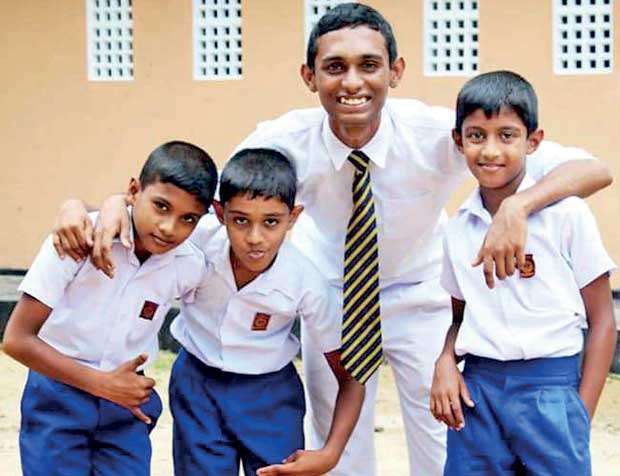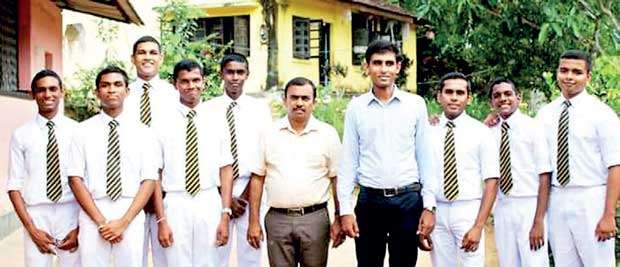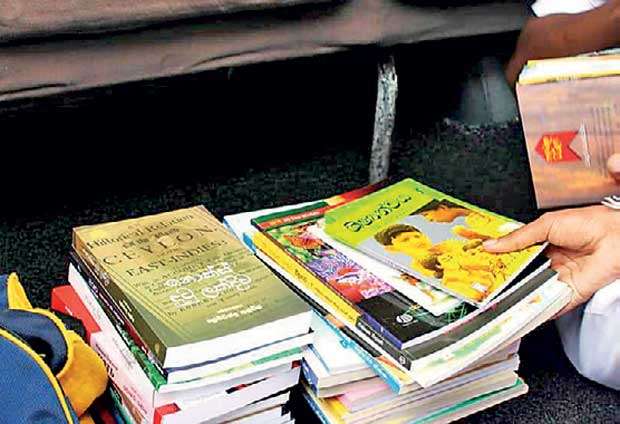Reply To:
Name - Reply Comment
Last Updated : 2024-04-23 22:35:00

 Mrs. Malathi, who taught us biology but whom I never had the chance of studying under, was quite a character. Hardy, confident, stern, but understanding, she was easy to irk and hard to please. In fact, that was one of her virtues. She was one of those rare teachers, from a now all-but-completely bygone era, who encouraged us to go beyond the classroom when it came to her subject. The result was that all her students, and I mean every one of them, grew to love her.
Mrs. Malathi, who taught us biology but whom I never had the chance of studying under, was quite a character. Hardy, confident, stern, but understanding, she was easy to irk and hard to please. In fact, that was one of her virtues. She was one of those rare teachers, from a now all-but-completely bygone era, who encouraged us to go beyond the classroom when it came to her subject. The result was that all her students, and I mean every one of them, grew to love her.
I remember an O/Level seminar I attended in Grade Eight. Nearly every teacher spoke on why we should choose their fields and on the careers they would open us to. Mrs. Malathi did no such thing. I don’t remember her exact words, but in essence, what she said amounted to this: “If you don’t have a green thumb, if you don’t know which plant and flower is what in your own garden, sorry, but don’t come to my class.” I distinctly remember my mother looking and frowning at me. I’m sorry to say that after all these years, she is still frowning at me.
I strongly believe that no society can prosper without actively engaging with “hard subjects”. In particular, science. There is some truth in the contention that society needs artists, but without industry and production, which since the 18th century have facilitated the evolution of modern science, there can be no environment conducive to artists in the first place. As a friend once put it to me, “No culture without industry!”
To be sure, Sri Lanka is not far behind here. But “not far behind” is not “full speed ahead.” The truth is that we are grappling with a serious problem on three broad fronts: the pedagogy, infrastructure, and interest of and in science.
Let’s get some perspective. Of 10,162 schools, only 867 have enough facilities for science subjects. On average, a student from the Western, Southern, Northwestern and Sabaragamuwa Provinces is more likely to choose science for his or her A/Levels than a student from another province. In Colombo and Gampaha, there’s one science stream school for every 10 kilometres, while in Moneragala, Mannar and Mullaitivu there is one for every 250. The disparity between the favoured and the unfavoured provinces, with all this, amounts to a shocking 20% (in terms of regional pass rates). As for teachers, the majority of them, once they gain experience, depart for more popular schools. The less popular schools have to do with “part time” teachers hired on a dubious, at times even illegal basis. In the end, the students lose out. “Free education rakes up inequalities,” someone once wrote somewhere. I would agree.
The Science Association of Royal College is doing something. By “something” I mean going beyond what is usually done. And by “what is usually done” I include those seminars and quizzes and interactive events which, relevant at one level, deteriorate at the end of the day to a series of “fun” skits and shows which serve little to no purpose
The solution, however, isn’t the privatisation of privileged institutions to concentrate on the less-privileged ones (as some advocate), but an efficient transfer of resources from those who have to those who do not. It is futile to think that the government, despite its efforts at combating structural anomalies, can solve every issue. Our best bets instead are the administrators, teachers, students, and science associations of the more favoured schools. No, they are not miracle workers. But they can help. Big time.
In that sense, the Science Association of Royal College is doing something. By “something” I mean going beyond what is usually done. And by “what is usually done” I include those seminars and quizzes and interactive events which, relevant at one level, deteriorate at the end of the day to a series of “fun” skits and shows which serve little to no purpose. By contrast, members of the Royal College association are tackling both the issues I highlighted before: resource anomalies and interest in the subject. That’s not just commendable, that’s also smart. And relevant.

True, there’s very little that a single organisation can do. But at a time when similar organisations engage in self-congratulatory projects elsewhere, the little that these boys do is worthy enough. Two months or so back, for instance, they paid a visit to Amaragedara Kanishta Vidyalaya in Bulathsinhala. That they conducted an O/Level seminar is not that important. What is important is that they soon came to terms with the issues and the deficits which beset such far-off schools.
Bulathsinhala, as statistics will confirm, is not exactly teeming with poverty, and as the boys in the Association told me a couple of weeks back, the road leading up to the vidyalaya has been paved and virtually polished so well that onlookers get baffled once they pass the school gates. It’s like entering a new world.
Yohan Chanaka, this year’s chairman, explained. “There were about 30 O/Level students there. It’s such a small population because most of them either leave before their O/Levels or graduate to better schools elsewhere. To be honest, we were not prepared to encounter such an environment when we planned the visit. We conducted the seminar just before the interval. During the interval, we walked around and talked with students from lower grades. They all had the same thing to say. They lack library and lab facilities. They don’t have enough teachers. They deserve better.”
Obviously, there’s very little that a single group can do: “We can’t perform miracles. We can’t change people. We can’t persuade administrators.” If that is so, however, what is it that they can contribute? Apart from seminars (they are planning on another one at a more distant school in the coming weeks), they can contribute, the way I see it, by changing the way “science events” in schools are organised.
Again, the Association at Royal is miles ahead. With one or two projects organised each month, the boys are adamant that such events must be geared towards the subject they are engaged with. I couldn’t agree more. What are Science and Commerce Days, after all, than exercises in noise and colour? When was the last time such a “day” actually stuck to its objectives without meandering to band shows and theatrical pieces? No, it is not that such items should not be encouraged, but then they do tend to detract one from what the “day” should be involved with in the first place.
On June 28, the Science Association, seeking something different, thus came up with Sci-ETCA. With the aim of demonstrating the practical component of science (which as academics have argued is missing, woefully, in the way the subject is taught here), ETCA saw the participation of a great many schools, around 15 stalls from sponsors, and sessions which actively involved invited students. “We wanted an event that would encourage participants to ascertain how experiments are conducted. What we did basically was transform their interest in those experiments into an opportunity to engage with experts in the field who are approachable.”
Sci-ETCA wasn’t isolated, incidentally. There had been seminars organised for students within the school before. The event had thus been an opportunity to project those seminars to the world outside, something these boys will continue through the sequel of sorts to ETCA, ENIGMA. Bigger and more ambitious in scope, ENIGMA is set to involve a quiz, a few lectures on important but tough areas in all three science subjects, and a motivation session.

Science is not “easy”. As Professor Deepthi Matthew observed not too long ago, parents spend almost two billion rupees every year on science tuition classes for their children. This, coupled with the rift between the number of students who do science at their A/Levels and the proportion who obtain adequate results to enter university, is a national issue, and for these boys, determined as they are to promote the subject in new, interesting ways, it is a problem they have to reckon with every day. As a final point then, I ask Yohan how students cope with the pressure this entails, and he points out that more often than not, they simply can’t: “Some of us go for two, even three classes over the same subject. There are those among us who cut school to attend these classes. They are not in the minority.”
Resource deficits outside the privileged provinces, and resource gluts and pressures in the privileged provinces: this is the rift at the heart of science education in the country, something Yohan touches on when he tells me, “Most of us do these subjects because it is felt we should do them.” How can one address this two-pronged problem? I feel tempted to ask these boys, in particular Yohan, but I desist. That is not up to them to elaborate. That is up to us to find out.
Suffice it to say, then, that the only real hope we can have when it comes to solving the issues of science education at school level, apart from efforts by OBUs and OGUs, are the clubs in more privileged institutions. Going by that, the Science Association at Royal is doing something. And that something, apart from being better than nothing, is probably the only thing we can claim as a veritable solution. Right now.
UDAKDEV1@GMAIL.COM

Add comment
Comments will be edited (grammar, spelling and slang) and authorized at the discretion of Daily Mirror online. The website also has the right not to publish selected comments.
Reply To:
Name - Reply Comment
On March 26, a couple arriving from Thailand was arrested with 88 live animal
According to villagers from Naula-Moragolla out of 105 families 80 can afford
Is the situation in Sri Lanka so grim that locals harbour hope that they coul
A recent post on social media revealed that three purple-faced langurs near t